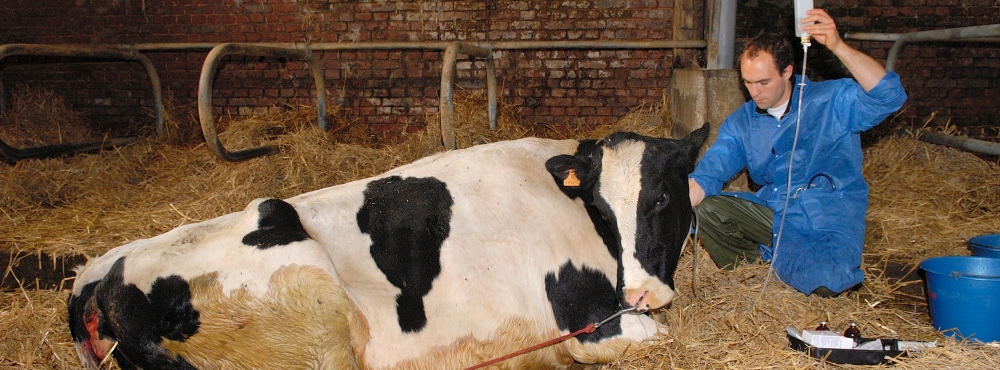Leesvoer (Rund)
- Laatste nieuws
- Leesvoer (Alpaca)
- Leesvoer (Honden & Katten)
- Leesvoer (Ongedierte)
- Leesvoer (Paard)
-
Leesvoer (Rund)
- Afrastering (Hoe werkt afrastering?)
- Boterzuurbacterie
- DCD Certificaat
- De Gelatineboli
- De invloed van biest op diarree bij kalveren.
- Fosforgebrek (P)
- Het belang van biest voor pasgeboren dieren
- Hittestress
-
Klinische melkziekte
- Lang leve de koe!
- Mastitis & tepelcanules: welke, wanneer en hoe?
- Meten is weten
- Ontworming zonder kalender
- Slepende Melkziekte
- Uierverzorging
- Vergiftiging door het eten van onrijpe eikels
- Vliegenbestrijding in de stal
- Vliegenbestrijding op vee
- Zomerdeken voor kalfjes
- Zomerwrang
- Zoutbehoefte
- Afrastering (jongvee)
- Diarree bij kalveren
- Selenium verstrekken
- Leesvoer (Schaap)
- Productintroducties
Klinische melkziekte

Calcium niet intraveneus toedienen
Klinische melkziekte wordt zelden waargenomen, maar toch krijgt één op de twee koeien die al eerder afgekalfd hebben na de geboorte, te maken met een subklinisch calciumtekort. Dit subklinisch calciumtekort kan alleen worden aangetoond met een bloedtest (serummonster 0-48 uur na het afkalven, calcium <2,0 mmol/l).
Waarom is Calcium belangrijk?
Calcium is belangrijk voor het immuunsysteem (signaalwerking) en het samentrekken van het spierstelsel, het maag-darmstelsel en de baarmoeder. Vooral oudere koeien lopen een groter risico.
Ter preventie (voorkoming)
Ter preventie (voorkoming) kan onmiddellijk na het afkalven extra calcium worden toegediend. De manier van toedienen speelt een belangrijke rol voor wat betreft de effectiviteit. Door het intraveneus (direct in de bloedbaan) toedienen van calcium stijgt de calciumspiegel extreem en daar gaat het lichaamseigen regulatiemechanisme van de koe tegen in verzet. Het kan gebeuren dat zich daardoor opnieuw een tekort voordoet. Daarom moeten alleen koeien met klinische melkziekte extra calcium intraveneus toegediend krijgen.
Voor koeien met subklinische melkziekte is een orale toediening van calcium beter geschikt.
Bron: Elite december 2016 / januari 2017 bladzijde 34/35.
Voor orale toediening zijn bij ons meerdere producten geschikt:
Calbal Plus (vloeibaar)
• Calbal Plus is een calciumpreparaat met als extra aanvulling: magnesium, cobalt, fosfor, vit. D3, niacine, vit. B12.
Calcium bolus gold / Rumivet Calcium
• Calcium bolus met 60 gram calcium-propionaat.
• Naast het verstrekken van direct beschikbaar calcium wordt ook energie verstrekt.
Afkalf drank
• Afkalf drank voor een optimale start van de lactatie.
• Super smakelijke koedrank met energie, mineralen en vitaminen.
• Een combinatie van: calcium, natrium, zink, weipoeder, plantaardige vetten, dextrose, vitamine A, vitamine D3, vitamine C, vitamine E.




